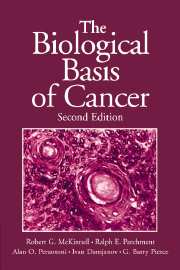Book contents
- Frontmatter
- Contents
- Preface
- Introduction: Letters illustrating clinical aspects of cancer
- 1 The pathology of cancer
- 2 Invasion and metastasis
- 3 Carcinogenesis
- 4 Genetics and heredity
- 5 Cancer-associated genes
- 6 Cancer in nonhuman organisms
- 7 Epidemiology
- 8 Lifestyle: Is there anything more important?
- 9 The stem cell basis of cancer treatment: concepts and clinical outcomes
- 10 Oncology: The difficult task of eradicating caricatures of normal tissue renewal in the human patient
- Appendix: Description of selected tumors
- Glossary
- References
- Index
- Plate section
8 - Lifestyle: Is there anything more important?
Published online by Cambridge University Press: 05 June 2012
- Frontmatter
- Contents
- Preface
- Introduction: Letters illustrating clinical aspects of cancer
- 1 The pathology of cancer
- 2 Invasion and metastasis
- 3 Carcinogenesis
- 4 Genetics and heredity
- 5 Cancer-associated genes
- 6 Cancer in nonhuman organisms
- 7 Epidemiology
- 8 Lifestyle: Is there anything more important?
- 9 The stem cell basis of cancer treatment: concepts and clinical outcomes
- 10 Oncology: The difficult task of eradicating caricatures of normal tissue renewal in the human patient
- Appendix: Description of selected tumors
- Glossary
- References
- Index
- Plate section
Summary
Louis Pasteur (1822–1895), when considering a disease, was more interested in how can it be prevented, not, how can it be cured.
A. Ochsner 1954The most desirable way of eliminating the impact of cancer in humans is by prevention.
L. Wattenberg 1985The ultimate goal in the control of any disease is prevention, and so it is with cancer.
Y. Hayashi et al. 1986Evidence suggests that one third of the more than 500,000 cancer deaths that occur in the United States each year can be attributed to diet and physical habits, with another third due to cigarette smoking.
T. Byers et al. 2002Introduction
It has been estimated that two-thirds of all cancers can be prevented by lifestyle modification (see Byers epigraph above). In contrast to the abundance of cancer that is clearly preventable, it may come as a surprise to learn that there is an anticipated massive 50 percent increase worldwide in cancer incidence by 2020 (Stewart and Kleihues 2003). The title to this chapter is thus entirely appropriate and readers of this book, with the possible exception of those who are already afflicted with cancer, should take heed. Of course, those who already suffer with cancer have family and friends and hence, it is not inappropriate for them to read this for the benefit of those they love. Ochsner (1954) believed that education must play a role in risk reduction.
- Type
- Chapter
- Information
- The Biological Basis of Cancer , pp. 248 - 265Publisher: Cambridge University PressPrint publication year: 2006



